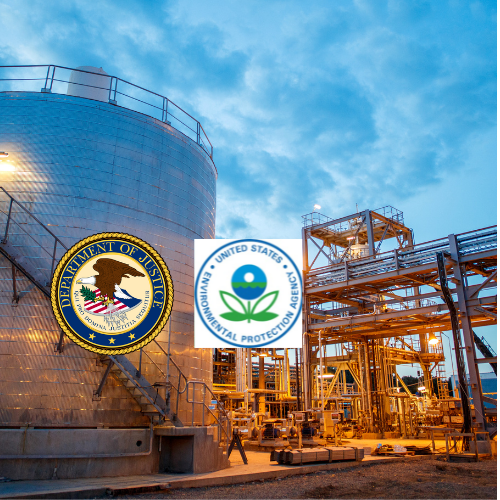This week saw several enforcement actions announced against oil and gas companies for violations of environmental regulations involving both the US Environmental Protection Agency (EPA) and the US Department of Justice (DoJ).
The first case, a joint action between the EPA and DOJ, involved the Marathon Oil Company which was on the receiving end of penalties totaling USD $241.5 million for several Clean Air Act violations. The EPA announcement can be found here and the DOJ announcement here. The EPA has also built a webpage dedicated to the Marathon enforcement case (click here).
In summary:
- The enforcement action involves Clean Air Act violations at the company’s oil and gas production operations on the Fort Berthold Indian Reservation in North Dakota;
- This is the first case against an oil and gas producer for violations of major source emissions permitting requirements under the Clean Air Act’s “Prevention of Significant Deterioration” (PSD) programme (click here);
- The complaint alleges that Clean Air Act violations occurred at nearly 90 Marathon facilities and resulted in the release of thousands of tons of illegal pollutants, including volatile organic compounds (VOCs) and carbon monoxide along with greenhouse gases (including methane);
- Marathon failed to comply with multiple volatile organic compound emission control requirements under several New Source Performance Standards (NSPS) and the Fort Berthold Indian Reservation’s Federal Implementation Plan applicable to storage vessels located at oil and natural gas production facilities;
- Marathon also failed to obtain preconstruction permits under the PSD programme and failed to apply for operating permits under the Clean Air Act’s Title V permit programme (click here);
- The details of the 154-page Consent Decree (click here) are summarised below (a Consent Decree is a legally binding agreement used by US federal law enforcement agencies to resolve a dispute or lawsuit without conferring guilt or liability):
- Under the proposed consent decree, Marathon agreed to invest USD $177 million to address its noncompliance for all oil well pads on the Fort Berthold Indian Reservation and will:
- Apply and obtain permits that require Marathon cap VOC emissions to less than 100 tons per year;
- Install and operate flow meters and temperature monitors at flares to continuously monitor flare operation; and
- Install automation that shut-in production when the facility exceeds emission limits, or the flares are not operating.
- At all the 169 facilities subject to the consent decree, Marathon agreed to:
- Conduct an engineering evaluation to ensure the facility is designed to route all emissions to a control device and many facilities will have automated shut-in to prevent emissions from releasing to atmosphere;
- Conduct more frequent infrared camera inspections and audio, visual, and olfactory (AVO) inspections;
- Perform enhanced preventative maintenance; and
- Install tank pressure monitors.
- Marathon also agreed to mitigate past excess emissions by:
- Purchasing two infrared cameras for the EPA’s Energy Division of several facilities for use to inspect facilities for illicit VOCs on the Fort Berthold Indian Reservation;
- Construct new well pads in the state of North Dakota both within the exterior boundaries and outside the exterior boundaries of the Fort Berthold Indian Reservation using a lowest emitting automated facility design to substantially reduce emissions, and all facilities must emit less than 100tpy of VOCs;
- Replace or retrofit 870 venting pneumatic devices with zero-emission devices; and
- Replace approximately 49 shop-built flares with engineered flares that will achieve a greater destruction rate efficiency and reduce emissions.
- The above requirements mean that marathon must temporarily stop production if facility-wide emissions limits are exceeded or if flares are not operating properly;
- The settlement also requires Marathon to pay a USD $64.5 million civil penalty - the largest ever for violations of the Clean Air Act at stationary sources;
- The announcement notes that while Marathon is only the 22nd largest US oil producer it is the 7th largest emitter of greenhouse gas (GHG) emissions in the oil and gas industry;
- An enforcement administrator from the EPA is quoted as saying
"The $64.5 million Clean Air Act penalty and the substantial measures Marathon must take to reduce its harmful air emissions demonstrate that EPA will not allow oil and gas companies to put corporate profits ahead of protecting communities and the environment. As a result of today’s settlement, Marathon will dramatically cut its emissions of methane, a climate super-pollutant that is dozens of times more potent in the near term than carbon dioxide. EPA is committed to doing everything possible to limit climate change and promote a sustainable future."
The second case (click here) saw the EPA announce a settlement agreement with Cunningham Energy, LLC and its parent, Houston Natural Resources Corp for violations of the Clean Air Act and the West Virginia State Implementation Plan associated with two Cunningham oil and gas well pads located at Shelton Road in Bomont, West Virginia. The EPA’s case docket can be found here. In summary:
- Cunningham failed to comply with permitting requirements and to properly control, monitor, and report emissions of volatile organic compounds (VOC) at its Bomont facilities;
- Specifically, the EPA docket outlines the following 11 counts:
- Failure to Route All VOC Emissions from Storage Vessels 32S-33S & 39S-44S to a Control Device at the King Pad;
- Failure to Reduce VOC Emissions by 95% at storage vessels 31S & 34S within 60 Days of Startup at the King Pad;
- Failure to Install a Cover on the Storage Vessels with an Impermeable Barrier at the King Pad;
- Failure to Conduct an Assessment of the Closed Vent System at the King Pad;
- Failure to Monitor All Fugitive Emissions Components at the King Pad;
- Failure to Develop and Emissions Monitoring Plan for the King Pad;
- Failure to Comply with Recordkeeping Requirements for engine 37S at the King Site;
- Failure to Submit G-70 Annual Certifications for the Cochran Pad;
- Failure to Conduct the Emissions Determination for Each Storage Vessel at the Cochran Pad;
- Failure to Use a Site-Specific Example to Determine Potential Facility VOC Emissions at the Cochran Pad;
- Failure to Submit Annual Reports for the King Pad and Cochran Pad.
- The consent agreement and final order requires Cunningham and its parent to pay a USD $742,737 penalty for these violations plus accrued interest, for a total of USD $764,274.
The third case (click here) saw Enterprise Gas Processing LLC and Enterprise Products Operating LLC, a Colorado-based gas processing company, penalised for various violations of the Clean Air Act and state clean air laws. The complaint may be found here and the DOJ’s Consent Decree may be found here.
- The complaint, which was filed concurrently with the settlement, alleges that the company violated leak detection and repair requirements in accordance with the Clean Air Act and state clean air laws. This resulted in excess emissions of VOCs and other pollutants into the atmosphere;
- The case docket outlines the following eight counts:
;
- Failure to Make First Attempt at Repair within Five Days After Leak is Detected in Violation of Subpart KKK;
- Failure to Repair Leaking Equipment within 15 Days in Violation of Subpart KKK;
- Failure to Identify Applicability of Subpart KKK to Equipment at the Meeker Gas Plant;
- Failure to Monitor Valves Monthly after Detecting a Leak;
- Failure to Repair Leaking Equipment within 15 Days Based on Invalid Use of Delay of Repair;
- Failure to Repair Leaking Equipment within 15 Days Based on Invalid Use of Delay of Repair;
- Failure to Comply with No Detectable Emissions at Valves and PRDs;
- Failure to Identify Applicability of Subpart OOOO to Equipment at the Meeker Gas Plant.
- Enterprise will take corrective actions and pay a USD $1 million civil penalty.
 RegTrail Insights
RegTrail Insights
A notable feature of several of the above cases is the linking of climate change and GHG emissions impacts to the Clean Air Act charges. It seems evident that the EPA, working with the DOJ, is increasingly targeting firms for violations of the Clean Air Act in conjunction with GHG emissions failings. The magnitude of the Marathon Oil fine is also likely a cause of concern for the operators of oil and gas upstream production in the US, particularly where local communities are impacted.


